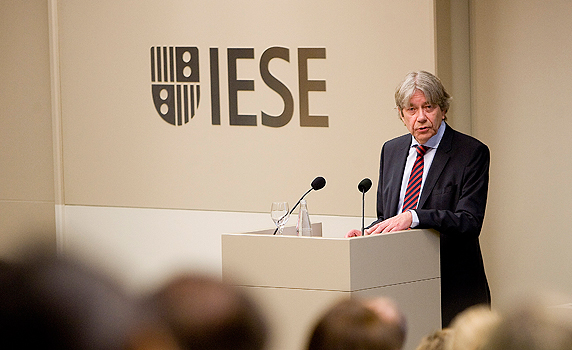
"Greater political and economic integration is needed if Europe is going to survive the challenges of globalization," the ambassador of the Federal German Republic in Spain, Reinhard Silberberg, told EMBA students at a session in the Global Leadership Series titled "The Future of Political and Economic Integration in Europe." The meeting, which was held on the Barcelona campus, was presided over by Dean Jordi Canals and presented by Prof. Franz Heukamp.
Silberberg’s talk focused on the insufficient rules and mechanisms in the Union as it stands. "The Maastricht treaty has not allowed us to avoid imbalances in the euro, nor the problems of public and private debt in many member states," he said. "A lack of competitiveness, regulation and control have played a key role in all of these processes." He added that "the crisis has shown us how we are interlinked as a continent and how the financial situation in one country influences decisions taken in another, and with the current imbalances this can only be corrected with greater integration."
The Four Pillars of a New EU
Ambassador Silberberg listed four axes around which integration needs to revolve in order to create a more united Europe. The first is a common economic policy. "We need a lot more supervision and control at the European level in order to deal with the current debt problems. The financial markets cannot be an issue for member states but must be regulated in an integrated manner by the EU with a European mechanism for banking supervision."
The second is a common fiscal policy. "We need the right to intervene in budgets and all members have to play by the same rules if we are to avoid another crisis like this one in the future," he said.
The third axis is linked economic coordination, which currently doesn’t exist, Silberberg said. "It’s essential to create new linked norms and mechanisms for intervention for those countries that don’t meet their objectives, with the aim of achieving a more sustainable level of competitiveness. Furthermore, business needs to be more focused towards emerging economies which consume an increasing amount of those products of which the EU is a pioneering and also a competitive producer, such as technology."
Finally, if these three pillars are to function well, it is essential "to strengthen the democratic legitimacy of European decisions." Silberberg added that "the future EU has to have a much stronger parliament, capable of legislating, and a government that is capable of carrying out decisions. We have to strengthen the coherence and impact of decisions, strategic relationships and even consider the possibility of a common defense and security system."
In the final analysis, the ambassador said, the EU is an institution that was created by all of us to bring peace and prosperity to the continent and for this reason "we have to take good care of it and demand personal commitment from all Europeans."